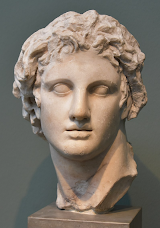Many were the teachers and educators of Alexander the Great, but few influenced him deeply and shaped his character and personality. The greatest of all was of course Aristotle, whose influence on the young king was enormous, as is known. There were others too,
and this was logical, since Philip II of Macedon wanted to offer his son the best education he could have.For this reason, he invited the best “minds” of the time from all over
Greece. Thus, the list of Alexander’s educators includes Philiscus, the famous mathematician Menaechmus, and Leonidas (uncle of Olympias). From the distant -for Macedonia- Acarnania, Philip had heard of a certain Lysimachus, whose fame had surpassed the barren lands of Acarnania, due to his particular methods in educating the young. He was characterized by exuberance and controlled flattery, but also by his ability to transmit moderation, self-control and submission to impulses.Soon, the Acarnanian Lysimachus was called by the most important personality of the time, Philip II, to undertake, together with Leonidas of Epirus, the basic education of the young Alexander. He abandoned his beloved homeland and arrived in the Macedonian capital of Pella, where he was received with honors by Philip and Olympias. He quickly gains the appreciation of his great student, since he immediately introduces Alexander to the treasures of Greek
tradition and the history of his ancestors. At the same time, he arouses his interest in theater, poetry and the arts. Little Alexander is impressed by what he learns from his teacher, especially from the Homeric epics and more from the Iliad, the story of the Trojan War. Lysimachus probably turned the lesson into a game. This great teacher taught the Iliad by impersonating Phoenicia (Achilles' tutor), Alexander had the role of Achilles and Hephaestion, the role of Patroclus. Gradually, little Alexander identified with the great Achilles and always wanted to be like him and surpass him.How much influence Lysimachus had on the young heir is demonstrated by Alexander's noble physiognomy, as it is recorded in detail by the historians of antiquity. Furthermore, his passion for the
Iliad, in the way Lysimachus taught it, is shown by the fact that Alexander, until his death, had under his pillow, in addition to his sword, a copy of the Iliad, which he read during some of his breaks. Also, when he set foot in Troy, as the leader of the Greeks against the Persians, he paid homage to the tomb of Achilles and Patroclus, and always had with him the shield of the Homeric hero, which he received as a gift from the priests of the temple of Troy. Lysimachus remained in Pella, even when Aristotle took over the now teenage Alexander.



Δεν υπάρχουν σχόλια:
Δημοσίευση σχολίου